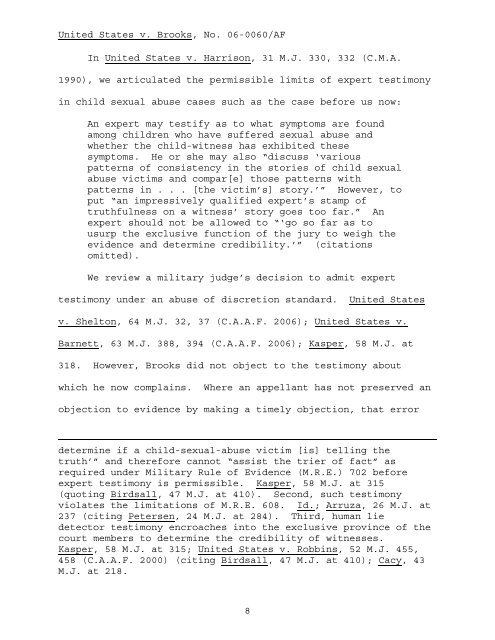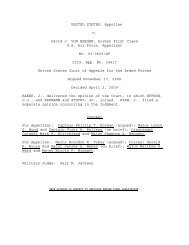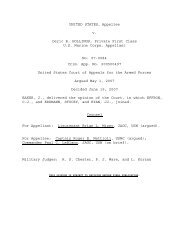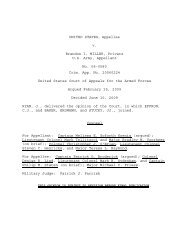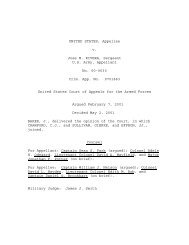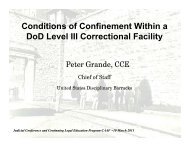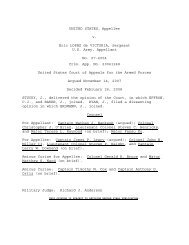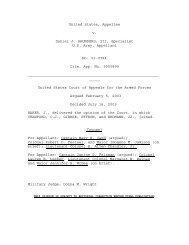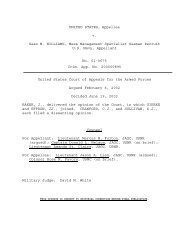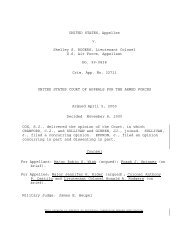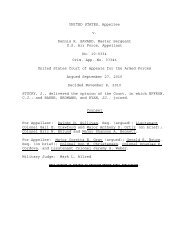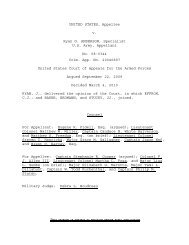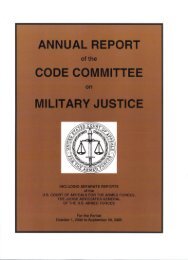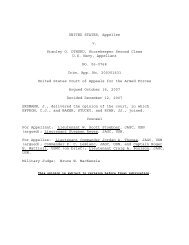U.S. v. Brooks - U.S. Court of Appeals for the Armed Forces
U.S. v. Brooks - U.S. Court of Appeals for the Armed Forces
U.S. v. Brooks - U.S. Court of Appeals for the Armed Forces
You also want an ePaper? Increase the reach of your titles
YUMPU automatically turns print PDFs into web optimized ePapers that Google loves.
United States v. <strong>Brooks</strong>, No. 06-0060/AFIn United States v. Harrison, 31 M.J. 330, 332 (C.M.A.1990), we articulated <strong>the</strong> permissible limits <strong>of</strong> expert testimonyin child sexual abuse cases such as <strong>the</strong> case be<strong>for</strong>e us now:An expert may testify as to what symptoms are foundamong children who have suffered sexual abuse andwhe<strong>the</strong>r <strong>the</strong> child-witness has exhibited <strong>the</strong>sesymptoms. He or she may also “discuss ‘variouspatterns <strong>of</strong> consistency in <strong>the</strong> stories <strong>of</strong> child sexualabuse victims and compar[e] those patterns withpatterns in . . . [<strong>the</strong> victim’s] story.’” However, toput “an impressively qualified expert’s stamp <strong>of</strong>truthfulness on a witness’ story goes too far.” Anexpert should not be allowed to “‘go so far as tousurp <strong>the</strong> exclusive function <strong>of</strong> <strong>the</strong> jury to weigh <strong>the</strong>evidence and determine credibility.’” (citationsomitted).We review a military judge’s decision to admit experttestimony under an abuse <strong>of</strong> discretion standard. United Statesv. Shelton, 64 M.J. 32, 37 (C.A.A.F. 2006); United States v.Barnett, 63 M.J. 388, 394 (C.A.A.F. 2006); Kasper, 58 M.J. at318. However, <strong>Brooks</strong> did not object to <strong>the</strong> testimony aboutwhich he now complains. Where an appellant has not preserved anobjection to evidence by making a timely objection, that errordetermine if a child-sexual-abuse victim [is] telling <strong>the</strong>truth’” and <strong>the</strong>re<strong>for</strong>e cannot “assist <strong>the</strong> trier <strong>of</strong> fact” asrequired under Military Rule <strong>of</strong> Evidence (M.R.E.) 702 be<strong>for</strong>eexpert testimony is permissible. Kasper, 58 M.J. at 315(quoting Birdsall, 47 M.J. at 410). Second, such testimonyviolates <strong>the</strong> limitations <strong>of</strong> M.R.E. 608. Id.; Arruza, 26 M.J. at237 (citing Petersen, 24 M.J. at 284). Third, human liedetector testimony encroaches into <strong>the</strong> exclusive province <strong>of</strong> <strong>the</strong>court members to determine <strong>the</strong> credibility <strong>of</strong> witnesses.Kasper, 58 M.J. at 315; United States v. Robbins, 52 M.J. 455,458 (C.A.A.F. 2000) (citing Birdsall, 47 M.J. at 410); Cacy, 43M.J. at 218.8


